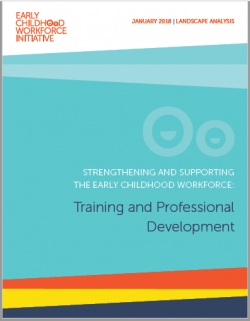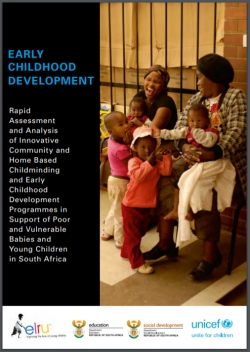Early Childhood Workforce Initiative, January Strengthening and supporting the early childhood workforce : competences and standards : landscape analysis

Book Stores
Type
E-Book
Authors
Category
ECCE, Preschool
[ Browse Items ]
Publication Year
2018
Publisher
Results for Development Institute, Washington, DC, United States
URL
[ private ]
Pages
42 p.
Subject
Early childhood care and education (ECCE), Young children, Workforce, Practitioners, Competencies, Skills, Training, Professional development, Monitoring, Mentoring
Tags
Series Name
Abstract
There is substantial and growing evidence that early childhood development (ECD) services positively impact children's development. Despite increasing knowledge and awareness of the benefits of ECD, we do not know enough about the early childhood workforce, who play a major role in delivering quality ECD services. Key questions about the ECD workforce require greater reflection:
• What do early childhood professionals and paraprofessionals need to know and do in order to perform effectively?
• How do requisite knowledge and skills vary across contexts?
• What types of training and support do staff receive?
• How is the early childhood workforce recruited, monitored, and evaluated?
In an effort to address these questions, the Early Childhood Workforce Initiative (ECWI), led by the International Step by Step Association (ISSA) and Results for Development (R4D), was created as a multi-stakeholder effort to support and empower those who work directly with young children. To inform and guide the Initiative, R4D is carrying out a series of global landscape analyses to establish the size and scope of the challenges faced by the early childhood workforce, while also highlighting promising practices countries have adopted in response to these challenges. Covering a range of roles including professionals and paraprofessionals, paid and unpaid workers, and frontline workers, trainers, supervisors, and managers from the education,2 health and nutrition, social protection and child protection sectors, these analyses aim to provide a comprehensive overview of the current status of the workforce worldwide. The four themes3 which will be explored in this series include competences and standards, training and professional development, monitoring and mentoring, and recognition of the profession. This report, the second in this series, addresses the theme of competences and standards.’ [Introduction]
• What do early childhood professionals and paraprofessionals need to know and do in order to perform effectively?
• How do requisite knowledge and skills vary across contexts?
• What types of training and support do staff receive?
• How is the early childhood workforce recruited, monitored, and evaluated?
In an effort to address these questions, the Early Childhood Workforce Initiative (ECWI), led by the International Step by Step Association (ISSA) and Results for Development (R4D), was created as a multi-stakeholder effort to support and empower those who work directly with young children. To inform and guide the Initiative, R4D is carrying out a series of global landscape analyses to establish the size and scope of the challenges faced by the early childhood workforce, while also highlighting promising practices countries have adopted in response to these challenges. Covering a range of roles including professionals and paraprofessionals, paid and unpaid workers, and frontline workers, trainers, supervisors, and managers from the education,2 health and nutrition, social protection and child protection sectors, these analyses aim to provide a comprehensive overview of the current status of the workforce worldwide. The four themes3 which will be explored in this series include competences and standards, training and professional development, monitoring and mentoring, and recognition of the profession. This report, the second in this series, addresses the theme of competences and standards.’ [Introduction]
Number of Copies
1
| Library | Accession No | Call No | Copy No | Edition | Location | Availability |
|---|---|---|---|---|---|---|
| Main | 734 | 1 | Yes |




